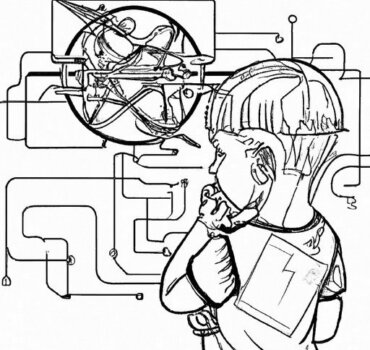
I asked DAL·E-2 to do a ‘line sketch’ of the concept “A boy surveys his future and it’s full of AI”

I asked DAL·E-2 to do a ‘line sketch’ of the concept “A boy surveys his future and it’s full of AI”
Every dentist appointment and family gathering; every awkwardly silent moment that to everyone but me begs for Smalltalk seems to herald the arrival of the same question these last few months: ‘so, what are you doing next year?’
Lately, at least, I’ve had an answer, if only to smooth the conversation along: going to Uni, at Otago, probably, to study Genetics.
So I’ve been thinking about career decisions for this reason—people won’t let me forget about it. But I’m also thinking about it for a more niche reason: in the last few weeks, I’ve been experimenting with two Artificial Intelligence systems known as GPT-3 and DAL·E-2.
Both are the progeny of the Elon Musk-funded AI research centre OpenAI. GPT-3 is what’s known as a “text transformer”, meaning that it takes in text you give it (the “prompt”) and spits out text that it thinks best completes the prompt.
This is impressive enough—but what you can also do is “train” GPT-3 on a large data set of prompts and completions: for example all of my columns as the completions, and some brief pitches as the prompts.
GPT-3 thus learns to assimilate my writing style and the nature of my brief.
So, I can feed it “Write a column in the style of Matteo Di Maio on the topic of youth voting” and…
GTP-3, in a second, duly spits out several 500-word columns to choose from: the first starting with “When a friend commented recently that young people are really, really not engaging in the world, I was taken aback. According to Stats NZ…”
When people talk about automation stealing all the jobs, they usually have big gleaming automotive factory manufacturing chains in mind. Either that, or they worry about, say, self-driving cars making Uber drivers redundant.
What they don’t tend to consider is AI stealing jobs in the creative industries—composing, art, architecture—and, yes, column writing. And yet it is in these curious areas that AI has been making the greatest strides recently.
What my experience with GPT-3—and its perfectly passable attempts at imitating my penmanship—has made me do is reinterpret all the little bits of career advice I’ve been fed these last few months after the “next year” conversation.
One thing people (Read: Principals in end-of-year speeches) always say is: “These days employers want creative, adaptable people who aren’t too set on one particular job for the rest of their life”.
But this seems a little dubious in our post-GPT-3 age. As we’ve seen, creativity is surely no more guarantee of a job hire in a future AI-dominated world than a machine-like ability to follow directions to the book.
The other classic piece of advice is “Do something you enjoy and you’ll never work a day in your life.”
This seems to be the only idiom that holds up.
At some point in the future (the only bet is how long) all jobs will necessarily become purely recreational. After all, what’s the News to find in me when editor Roy can get 100 different columns on youth issues in my style at the click of a button (and a $0.02 micro-charge)?
The implication of all of this is that the answer to the question “what are you doing next year” really ought to be nothing more than: “Something I enjoy, hopefully.” After a week of being imitated by a robot, it’s my new answer for sure.








